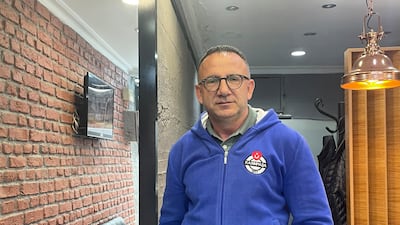In Kasimpasa, a modest neighbourhood on the European side of Istanbul, political fervour is building.
Street conversation is drowned out by the blare of election buses cruising through narrow streets adorned with Turkish flags and posters of Turkish President Recep Tayyip Erdogan, who grew up here.
With only two days to go until the country's most decisive election in modern history, Mr Erdogan's legacy hangs in the balance amid a tight race for the presidency.
The stakes were further ramped up on Thursday when a third candidate withdrew from the poll.
Supporters of the ruling Justice and Development Party, or AKP, have gathered in a local square in Kasimpasa. On a nearby street, a lone poster for opposition candidate Kemal Kilicdaroglu stands amid a sea of Erdogan banners.
Hayri Goz, 59, has worked for more than 20 years at a local barbershop known for serving the President.
He flits between a customer and his phone, showing images with the President's son Bilal at the salon.
A framed photo of his colleague with a younger Mr Recep is displayed on the wall.
“100 per cent, I think Recep Tayyip Erdogan will be re-elected,” he says, artfully snipping a client's locks.
“It's not for personal reasons. He has done things for Turkey.
“When the opposition ruled, you had to wait days or days to even see a doctor. Now, when you go to the hospital, it's so clean you can even kiss the floor.”
Mr Goz, like many others here, dismisses the large opposition alliance running against the President, saying supporters of the main opposition front-runner Mr Kilicdaroglu are “opportunists”.
The salon, like many along this road, is quiet. With conversation turning to the economy, Mr Goz says business has been good despite record inflation.
“If Mr Erdogan is re-elected, I am sure inflation and the cost of living will decrease.
“Even if Kilicdaroglu won the election, he would last six months. The opposition coalition will break up, they will start fighting each other over government positions.”
A common plaudit of Mr Erdogan is his strongman image, skilfully managed to characterise him as a fiery defender of both Islam and Turkey.

“If you follow the Nato meetings, you can see that Mr Erdogan is a very important world leader. Nato has a lot of respect for him,” said Mr Goz.
Married couple Ayse, 42, and Mohammed Manus, 51, are both AKP supporters and are backing the President on Sunday.
“Erdogan is a strong leader and won't allow anyone to interfere in Turkey's internal policies,” said Mr Manus. “He won't allow anyone to pressure Turkey — he's the man of the people.”
Gungor Sivri, a lifelong Kasimpasa resident, is also voting for Mr Erdogan on Sunday.
He dismisses the ailing economy as a global issue, citing the pandemic and war in Ukraine, and defends the President's staunch opposition to increasing interest rates.
“There would be no investment in the country otherwise,” Mr Sivri said.
“Mr Erdogan as president, it gives me a guarantee that he will do more than the others. The opposition we know, all they've done in the last 20 years is lose against him.”
Turkey's battered economy has been at the forefront of discussions on the elections and has featured prominently in campaigning.
But locals here as well as economic and political experts say its importance is overstated — with identity being the main pull in either direction.
Turkey is experiencing “its deepest ever crisis” but the AKP still has wide support, said economist Dr Ilhan Dogus.
“We cannot normally explain this. Poverty has increased, inequality has increased, people's purchasing power has decreased, but his party is still first.
“Erdogan planned to reduce the negative impact of inflation on his votes by way of polarising society and curbing the Kurdish parties.
“Up until now, he has managed to compensate for this loss of votes because of rising inflation. He has tried to maintain identity politics to consolidate his voters.”
His supporters are mostly religious, Mr Dogus continued, and the secular parties have been against more religious rules — “hence the headscarf ban”.
“He has always exploited this trauma and has always played the role of father of the state or nation. 'If I fall, the state will fall and you will lose the rights gained under an AKP government,” he said.
“The hardest hit by Erdogan's inflation are the working class, but they're his biggest voter base.”
He added: “Erdogan's voters are aware that this economic crisis is because of his policies. But the opposition, up until now, have not succeeded in showing they will handle it much better than him.”


























